|
|
Gloria
Kan and John Langmore, Division for Social Policy and Development,
Vice-Chair Richelle, Chair Maquieira, and Kate Newell, Secretariat
|
| PrepCom
Chair Christian Maquieira (Chile) reported on progress made in
Working Group I, which dealt with Commitments 1,7,8,9, "the year
of the French Revolution." He said the Group was able to "guillotine"
a number of paragraphs. He said these commitments were the most complex
in terms of political requirements and technical demands they place
on delegations and exhibit the clearest expression of the overlapping
of economic and social issues. |
| Vice-Chair
and Working Group II Chair Koor Richelle (Netherlands) noted the
good atmosphere in which negotiations took place, and reported that
the Working Group completed a first reading of Commitments 2,3,4,5,6,
and 10 and all or part of a second reading of 2,3,4, and 6. He said
the more difficult issues are still pending and that more time is
still needed. He said some issues were explicitly not discussed pending
results of other meetings such as Commission on Human Rights and the
South Summit, as information from the results of these meetings could
help in formulating new action-oriented paragraphs. Photo:
Gloria Kan, Chief, Intergovernmental Policy Branch, Division for Social
Policy and Development, John Langmore, Director, Division for Social
Policy and Development, and Chair Richelle
|
|
Sonia Elliot, Guyana, reported on informal consultations and progress
made on paragraph 19 and 19 bis, on humanitarian assistance,
and refugees and internally displaced persons, and those paragraphs
related to the environment.
|
|
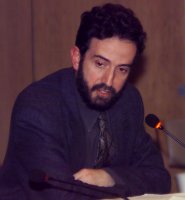 |
Auerlio Fernandez,
Spain, reported on paragraphs on reported on 38, on improving the
quality of work and level of employment, 39, on a multilateral initiative
to better understand the social dimension of globalization, and 64,
on preventing illegal trafficking and transport of migrants and trafficking
in persons, particularly women and children. |
|
Luis
Carranza, Guatemala, reported on paragraph 9, on unilateral measures.
He said the group had an healthy exchange of ideas but reached no
agreement
|
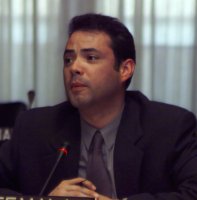 |
|
During its final session, Working Group I finished
a first read through of Commitment 7, on accelerated development
in Africa and in the Least Developed Countries
|
The Portuguese
delegation, for the EU. Ambassador Gonçalo Santa Clara Gomes
(center) proposed EU text on according priority to the Least Developed
Countries committed to poverty reduction and economic and social
reform
|
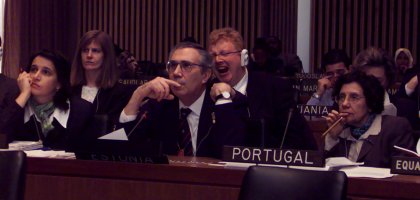
|
|
|
Algeria,
Bangladesh and Nigeria raise their flags to oppose an EU reference
to Least Developed Countries committed to poverty reduction and
economic and social reform, stating all countries are committed
and a specific reference would imply that some are not.
|
|
Algeria
and Bangladesh (left) and Nigeria and Namibia (right) consult the
text on the overhead projector. On Thursday, the G-77/China put
forward its proposal for a World Solidarity Fund in order to contribute
to the eradication of poverty and promote social development in
the poorest regions of the world
|
|
The
Algerian delegation in Working Group I
|
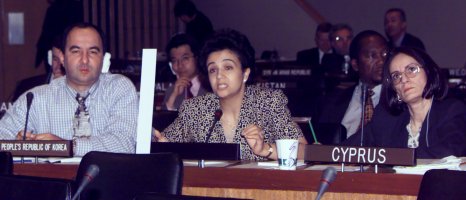
|
|
During its final session, Working Group II discussed
Commitment 2, eradicating poverty through decisive national actions
and international cooperation, and Commitment 4, on promoting social
integration
|
The Dominican
Republic (above left), Portugal, speaking for the EU (above right),
and the US (right)
On ensuring
appropriate and effective expenditure of resources for universal
access to basic education and primary health care, within the
country context, the EU called for language on additional
targeting for groups with special needs. With amendments by, inter
alia, Canada and the Holy See, delegates agreed to text on
particular efforts to target the special needs of vulnerable and
disadvantaged groups. The US explained that education and
health policy is often decided and implemented at the state level,
thus the reference to particular country context.
|
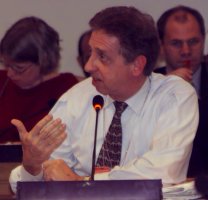 |
|
RealAudio Interviews with PrepCom
Chair Maquieira, Vice-Chair Richelle and ICSW President Julian Disney
|
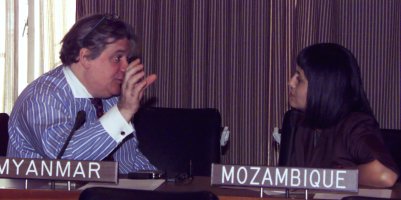 |
 PrepCom
Chair Christian Maquieira speaks with ENB writer Nabiha Megateli
(left) said there was less progress than expected, although progress
was made on some difficult issues such as sanctions. He highlighted
interesting proposals including the Canadian proposal for a currency
transfer tax and the G-77/China proposal for a Fund for Least Developed
Countries and Africa.
PrepCom
Chair Christian Maquieira speaks with ENB writer Nabiha Megateli
(left) said there was less progress than expected, although progress
was made on some difficult issues such as sanctions. He highlighted
interesting proposals including the Canadian proposal for a currency
transfer tax and the G-77/China proposal for a Fund for Least Developed
Countries and Africa.
|
|
Chair
Maquieira, pictured with ENB writer Gretchen Sidhu, also highlighted
the difficulties in understanding the move from an international
system to a global system..
|
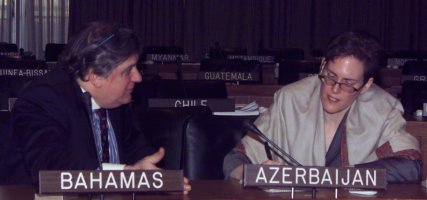 |
 ENB writer Nabiha Megateli speaks with Julian Disney, President,
International Council on Social Welfare (ICSW)
ENB writer Nabiha Megateli speaks with Julian Disney, President,
International Council on Social Welfare (ICSW)
|
|
 PrepCom
Vice-Chair and Working Group II Chair Koor Richelle
speaks with Richard Campbell and Tonya Barnes. Chair Richelle
stressed the importance of opening markets for developing countries,
and highlighted the issues of trade, decent work, aid and a comprehensive
development strategy. He called for a reorganization of the executive
structure of UN and said the UN has to move from norm and value
setting toward implementation.
PrepCom
Vice-Chair and Working Group II Chair Koor Richelle
speaks with Richard Campbell and Tonya Barnes. Chair Richelle
stressed the importance of opening markets for developing countries,
and highlighted the issues of trade, decent work, aid and a comprehensive
development strategy. He called for a reorganization of the executive
structure of UN and said the UN has to move from norm and value
setting toward implementation.
|
|
|
ENB writer
Richard Campbell familiarizes the Brazil with the ENB (left)
|
|
The
Algerian Delegation, with Pakistan (second from left) and Chair
Maquieira
|
|
|
|
Look!
What's that up on the screen in Conference Room 2? I can't believe
it!
|

 Linkages Coverage of the World Summit for Social Development in Copenhagen
Linkages Coverage of the World Summit for Social Development in Copenhagen
 A summary of the major issues
A summary of the major issues
 Agenda for the Second Session of the PrepCom
Agenda for the Second Session of the PrepCom
 Secretariat web site with official
documents and information
for NGO participants
Secretariat web site with official
documents and information
for NGO participants
 Secretary-general's
Report on the Implementation of the Outcome of the WSSD
Secretary-general's
Report on the Implementation of the Outcome of the WSSD
 Summary
of the WSSD agreements
Summary
of the WSSD agreements
 Information on the WSSD+5 Special Session
Information on the WSSD+5 Special Session

|